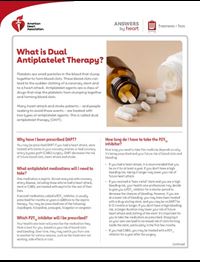Understanding Your Options When Taking Aspirin and Other Antiplatelet Drugs
Many people who have had a heart attack and stroke – and people seeking to avoid those events – are treated with what’s known as dual antiplatelet therapy. Simply put, that means taking aspirin along with a second drug to prevent blood clotting.
Dual antiplatelet therapy, referred to as DAPT, often is prescribed for people who have had heart attacks, are treated with stents in their coronary arteries, and some patients who undergo coronary artery bypass surgery.
Aspirin is an antiplatelet agent that probably will be prescribed for the rest of a person’s life, if they fall into one of these categories and don’t have strong reasons not to take it. A second type of antiplatelet agent, called a P2Y12 inhibitor, is usually prescribed for months or years in addition to aspirin.
You may be prescribed one of the following: clopidogrel, prasugrel, ticagrelor, ticlopidine or cangrelor. Which one you take and how long you take it depends on your personal risks for heart attack, stroke or other cardiovascular events and other factors that you’ll discuss with your health care professional.
The costs of each medication differ as well, which is another factor to discuss with your health care professional.
How long will I need to be on DAPT?
How long you need to take this medicine depends on why it’s being prescribed and your future risk of blood clots and bleeding.
- If you had a heart attack, it is recommended that you be on it for at least a year. If you don’t have a high bleeding risk, taking it longer may lower your risk of future heart attack.
- If you received a “bare metal” stent and you are a high bleeding risk, your health care professional may decide to give you a P2Y12 inhibitor for a shorter period to decrease the chances of bleeding. However, if you are at a lower risk of bleeding, you may have been treated with a drug-eluting stent, and you may be on DAPT for 6-12 months or longer. If you don’t have a high bleeding risk, a longer duration may lower your risk of future heart attack and clotting of the stent. It’s important for you to take the medication as prescribed. Stopping it on your own can lead to increased risk of clots forming inside the stent, particularly in the first few months.
- If you had CABG, you may be treated with a P2Y12 inhibitor for a year after the surgery.
Drug interactions to be aware of
People on DAPT should be mindful of the many interactions that can occur when taking multiple medications. Some over-the-counter medications can even create problems.
Ibuprofen and other non-steroidal inflammatory drugs can lead to problems with P2Y12 inhibitors.
Of course, many other drugs – and even some foods – can interact negatively with medications.
For example, grapefruit can affect the way some cholesterol medications work. And some blood thinners and anticoagulants such as warfarin can react to over-the-counter drugs like ibuprofen.

Printable patient sheet: What is DAPT? (PDF)





